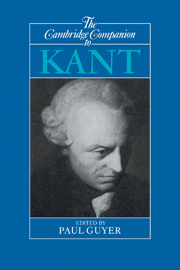Book contents
- Frontmatter
- Introduction
- 1 Kant's intellectual development
- 2 The Transcendental Aesthetic
- 3 Functions of thought and the synthesis of intuitions
- 4 The transcendental deduction of the categories
- 5 Causal laws and the foundations of natural science
- 6 Empirical, rational, and transcendental psychology
- 7 Reason and the practice of science
- 8 The critique of metaphysics
- 9 Vindicating reason
- 10 Autonomy, obligation, and virtue
- 11 Politics, freedom, and order
- 12 Taste, sublimity, and genius
- 13 Rational theology, moral faith, and religion
- 14 The first twenty years of critique
- Bibliography
- Index
2 - The Transcendental Aesthetic
Published online by Cambridge University Press: 28 May 2006
- Frontmatter
- Introduction
- 1 Kant's intellectual development
- 2 The Transcendental Aesthetic
- 3 Functions of thought and the synthesis of intuitions
- 4 The transcendental deduction of the categories
- 5 Causal laws and the foundations of natural science
- 6 Empirical, rational, and transcendental psychology
- 7 Reason and the practice of science
- 8 The critique of metaphysics
- 9 Vindicating reason
- 10 Autonomy, obligation, and virtue
- 11 Politics, freedom, and order
- 12 Taste, sublimity, and genius
- 13 Rational theology, moral faith, and religion
- 14 The first twenty years of critique
- Bibliography
- Index
Summary
Among the pillars of Kant's philosophy, and of his transcendental idealism in particular, is the view of space and time as a priori intuitions and as forms of outer and inner intuition respectively. The first part of the systematic exposition of the Critique of Pure Reason is the Transcendental Aesthetic, whose task is to set forth this conception. It is then presupposed in the rest of the systematic work of the Critique in the Transcendental Logic.
The claim of the Aesthetic is that space and time are a priori intuitions. Knowledge is called a priori if it is “independent of experience and even of all impressions of the senses” (B 2). Kant is not very precise about what this “independence” consists in. In the case of a priori judgments, it seems clear that being a priori implies that no particular facts verified by experience and observation are to be appealed to in their justification. Kant holds that necessity and universality are criteria of apriority in a judgment, and clearly this depends on the claim that appeal to facts of experience could not justify a judgment made as necessary and universal. Because Kant is quite consistent about what propositions he regards as a priori and about how he characterizes the notion, the absence of a more precise explanation has not led to its being regarded in commentary on Kant as one of his more problematic notions, even though a reader of today would be prepared at least to entertain the idea that the notion of a priori knowledge is either hopelessly unclear or vacuous.
- Type
- Chapter
- Information
- The Cambridge Companion to Kant , pp. 62 - 100Publisher: Cambridge University PressPrint publication year: 1992
- 38
- Cited by



